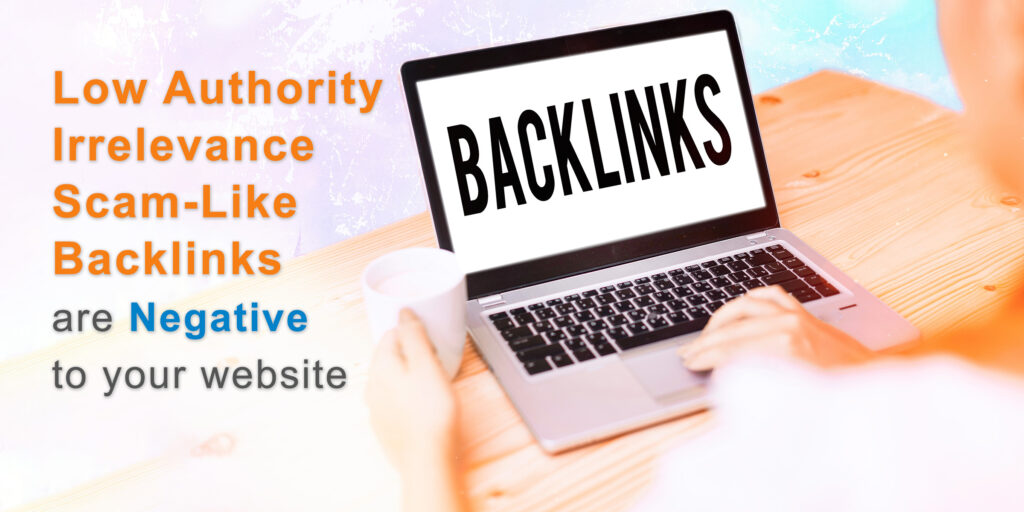In the vast and competitive landscape of the internet, websites strive to establish a strong online presence and attract organic traffic. A key component of achieving this goal is search engine optimization (SEO), which involves various strategies and techniques aimed at improving a website’s visibility on search engine results pages (SERPs). One crucial aspect of SEO is link building, which can significantly impact a website’s authority and relevance. However, not all backlinks are created equal, and the quality of these links plays a pivotal role in determining a website’s success. In this article, we will explore why low authority, irrelevant, and scam-like backlinks can be detrimental to your website’s reputation and SEO.
1. Understanding Backlinks
Before delving into the negative aspects of certain backlinks, it’s essential to understand what backlinks are and why they are important for SEO. Backlinks, also known as inbound or incoming links, are hyperlinks on external websites that point to your website. Search engines like Google consider backlinks as votes of confidence and authority. The more high-quality and relevant backlinks your website has, the more authoritative it is perceived to be, which can lead to improved search engine rankings.
1)Low Authority Backlinks
Low authority backlinks refer to links coming from websites with little to no credibility or trustworthiness in the eyes of search engines. These websites often have poor domain authority, low-quality content, and a history of spammy activities. Acquiring backlinks from such sources can have several detrimental effects on your website’s SEO efforts:
a. Reduced Trustworthiness: Search engines like Google assign authority and trustworthiness to websites based on the quality of their backlinks. When your site is associated with low authority sources, it can lead to a decline in your website’s trustworthiness, which may result in lower search engine rankings.
b. Negative Impact on User Experience: Low authority websites are often riddled with intrusive ads, poor design, and unreliable information. Linking to such websites can negatively impact the user experience, causing visitors to lose trust in your content and brand.
c. Increased Risk of Penalties: Google regularly updates its algorithms to penalize websites that engage in unethical SEO practices, including the acquisition of low-quality backlinks. If your website is caught associating with low authority sources, it may face penalties, such as a drop in search rankings or even removal from search results.
2) Irrelevant Backlinks
Relevance is another critical factor in determining the value of backlinks. Backlinks should ideally come from websites and content that are closely related to the subject matter of your website. Irrelevant backlinks, on the other hand, are links that originate from websites or content that have no connection to your site’s topic or niche. Here’s why irrelevant backlinks can harm your SEO efforts:
a. Diluted Authority: Search engines value backlinks that come from websites with related content because they indicate that your website is an authoritative source within its niche. Irrelevant backlinks, however, dilute the relevance of your website’s link profile, making it harder for search engines to understand your site’s focus.
b. Misleading Traffic: When irrelevant backlinks direct users to your website, they are likely to leave quickly since your content does not align with their interests. High bounce rates can negatively affect your website’s performance and SEO rankings.
c. Risk of Manual Action: Google’s Webmaster Guidelines discourage the use of irrelevant backlinks to manipulate search rankings. If your website is found to have a substantial number of irrelevant backlinks, it may be subjected to manual actions, which can result in penalties and a drop in rankings.
3) Scam-Like Backlinks
Scam-like backlinks are links that originate from websites engaged in deceptive, fraudulent, or malicious activities. These links can be particularly harmful to your website’s reputation and SEO for the following reasons:
a. Damage to Credibility: Associating your website with scam-like sources can severely damage your online credibility and trustworthiness. Visitors who encounter such backlinks on your site may question your intentions and integrity.
b. Increased Security Risks: Scam-like websites are often sources of malware, phishing attempts, and other security threats. When your website links to these sources, it can inadvertently expose your visitors to these risks, potentially leading to compromised user data and a tarnished reputation.
c. Search Engine Penalties: Search engines are committed to providing safe and reliable search results. Websites that are found to link to scam-like sources may face penalties, including removal from search results, to protect users from potential harm.

2. The Importance of Quality Backlinks
Now that we’ve discussed the adverse effects of low authority, irrelevant, and scam-like backlinks, it’s crucial to emphasize the importance of quality backlinks. Quality backlinks possess the following characteristics:
Relevance: Quality backlinks come from websites that share a thematic connection with your content. When relevant, they strengthen your website’s authority within its niche.
Authority: Quality backlinks originate from authoritative and trustworthy sources. Search engines consider these links as positive signals of your website’s reliability and credibility.
Natural Acquisition: Quality backlinks are obtained organically, without manipulation or unethical practices. They are typically earned through the creation of valuable content that naturally attracts links from other reputable websites.
Diverse Sources: A diverse link profile includes backlinks from various sources, such as news sites, educational institutions, industry-specific websites, and more. This diversity signals to search engines that your website is respected across different sectors.
Editorial Validation: Quality backlinks are editorially given by website owners or content creators who genuinely appreciate and endorse your content. They are not the result of paid placements or spammy tactics.
3. Protecting Your Website from Harmful Backlinks
Now that we’ve established the potential risks associated with low authority, irrelevant, and scam-like backlinks, it’s essential to understand how to protect your website from such threats:
Regular Backlink Audits: Conduct regular backlink audits using tools like Google Search Console, Ahrefs, or Moz. Identify and disavow any harmful or irrelevant backlinks that may have accumulated over time.
Monitor Referral Traffic: Keep an eye on your website’s referral traffic to detect any unusual or suspicious patterns. Sudden spikes in traffic from irrelevant or low-quality sources could be a sign of harmful backlinks.
Use the Google Disavow Tool: Google provides a Disavow Links tool that allows website owners to inform the search engine of links they want to disassociate from their site. Be cautious when using this tool and use it only when necessary.
Build Quality Backlinks: Focus on building a strong portfolio of quality backlinks by creating valuable and shareable content. Reach out to reputable websites within your niche for potential collaborations and guest posting opportunities.
Stay Informed: Stay updated with the latest SEO trends and search engine guidelines. Understanding what constitutes a harmful backlink will help you avoid them more effectively.
Conclusion
In the ever-evolving world of SEO, the quality of backlinks remains a critical factor in determining a website’s success. Low authority, irrelevant, and scam-like backlinks can have detrimental effects on your website’s reputation and search engine rankings. It’s essential to prioritize quality over quantity when it comes to backlinks and take proactive measures to protect your website from harmful links. By doing so, you’ll not only safeguard your site’s SEO performance but also build a solid foundation for long-term online success.
For more information, visit Bel Oak Marketing.





